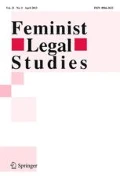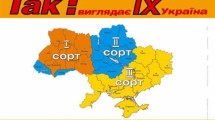Abstract
This article examines the issues of censorship, language and racism through a critical reflection on Peter Tatchell’s response to the critique of gay imperialism offered by Jin Haritaworn, Tamsila Tauqir and Esra Erdem. In ‘Academics smear Peter Tatchell’, we are invited to find evidence of ‘Islamophobia, racism or support for imperialist wars’ in the writings that can be downloaded from Tatchell’s website. The article shows how islamophobia and racism operate in Tatchell’s writings not necessary in the content of specific arguments but through the very form of proximities (for example in the proximity between the words ‘Islam’, ‘fundamentalism’ and ‘terror’). The article thus reflects on how racism operates in language through the repetition of associations that get ‘stuck’.
Similar content being viewed by others
Notes
All of Peter Tatchell’s writings referred to in this piece can be downloaded from his website: www.petertatchell.net. Last accessed 18 August 2010.
I am suggesting here that, whether or not Peter Tatchell and his team threatened the publisher with the law, their use of the language of libel to describe the article constituted a threat. Tatchell says they did not threaten litigation: my point would be that they did not need to, whether or not they did.
In Queer Phenomenology, I explored what I called ‘the paradox of the footprint’ (Ahmed 2006: 16): the path is created by being followed, and in being followed, a path is created. We can understand scripting in similar terms: a script is a pathway, in being followed, it is created, in being created, it is followed. To follow the words is to be directed in a certain way.
Tatchell in this supplementary response refers directly only to Erel and Klesse: however the article also uses terms like ‘my detractors’ and ‘my critics’ suggesting the object of the response is more generalised, and is thus anticipatory as a mode of defence (‘my critics’ easily becomes ‘anyone’ who would agree with the criticisms made in the original chapter).
See the final report from the project for a full description of the research, Ahmed, Hunter, Kilic, Swan and Turner (2006).
For example in an interview with Jonathan Dimbleby in 2006, Trevor Phillips argued that freedom of speech means the freedom to be offensive. He directed his comments specifically against Muslims in part in response to the controversy over the Danish cartoons. The very ‘offendability’ of Muslims becomes a restriction of our freedom. Freedom of speech becomes a quality attached to some rather than others. They ‘must’ accept our freedom or leave. See http://news.bbc.co.uk/2/hi/uk_news/4752804.stm for more information about this discussion. Last accessed 7 January 2009.
In other words, temporality is crucial to the work of this narrative: Christian/Western/European violence becomes ‘in the past’ as a way of Muslim violence into the present. I would argue that such temporalities are central to contemporary racism. Indeed, I would argue that racism in the contemporary context is itself associated with the past, as what we have overcome or left behind. Trevor Phillips during an interview he gave on the BBC to mark the 10th anniversary of the Macpherson report on 19 January 2009 says the following: “the Stephen Lawrence Inquiry was a great shock to the system. It shook people out of their complacency and meant that we had new laws and a new attitude and that meant for example that the police have changed their behaviour quite dramatically. Nothing’s perfect, there is still a lot of work to do, but we are in a different place than we were before”. We can notice in this description that the introduction of the language of institutional racism becomes a form of shock therapy that is understood to be the origin of new attitudes and new behaviour. Not only are institutions given psychological attributes in this account, but we have a clear narrative sequence of before and after, in which what comes after the recognition of institutional racism is marked by its difference to what came before. In other words, the institution in being shocked into recognising its racism is no longer racist. For Phillips ‘the we’ of the police slides immediately into ‘the we’ of the nation: “we are in a new situation. Britain is a modern diverse country. Britain is the best place to live in Europe if you’re not white”. The ‘shock’ of recognising institutional racism is what allows recovery from racism and even the emergence of racial equality. For Phillips any racism within an institution is explained as not really ‘going on’ even when it is ongoing: “In many of our institutions, there are still old-fashioned attitudes that don’t really catch up with where modern Britain is at and how British people today feel. That’s the next task that we’ve got to tackle”. Racism becomes in this description about what is ‘old-fashioned’ as if it lingers only insofar as institutions are not expressing what is in fashion. Racism enters contemporary discourses of race equality as an anachronism.
In this respect, the argument made here shares some features with fascist accounts which also position minority cultures as threatening the survival of the nation: see Ahmed (2004a, b). Rather the survival being a matter of kinship and blood, it becomes a matter of the transmission of values (including rights, diversity and equality).
Thanks to Katie King for directing me to Jane Ward’s excellent critique of diversity in queer politics.
Note how this version of the ‘coming out story’ is also a story of modernity and empire: queers of colour, especially Muslim queers, can ‘be out’ as queer subjects by coming out from the darkness of their cultures of origin and into the light of modernity, as the promise of inclusion, equality, freedom and happiness. In pointing to how the coming out story can be an imperial story, I do not want to suggest that queer politics as such should be identified with the West. Such identification would then ‘read’ any form of non-Western queer political mobilisation as a sign of Westernisation. We can see the problems of this reading strategy in Joseph Massad’s Desiring Arabs (2007) which in my view is an extremely problematic text for how it reduces queer politics to Western imperialism and thus reads those who participate in queer activity outside the West as ‘assimilating’ to the West. Just as we should not make Muslim ‘foreign’ to queer, we also should not make queer ‘foreign’ to Muslim: either strategy makes Muslims who identify as queer into foreigners. Massad’s book also involves both an inflation of the power of sexual minorities, as well as a conflation of different kinds of sexual and political practice, in its use of the umbrella term ‘the gay international.’ We need to be much more specific and focused in our critiques of the complicity of gay politics and imperialism to avoid making our own inflations and conflations.
References
Ahmed, Sara. 2004a. Declarations of Whiteness: The Non-Performativity of Anti-Racism. Borderlands 3(2).
Ahmed, Sara. 2004b. The cultural politics of emotion. Edinburgh: Edinburgh University Press.
Ahmed, Sara. 2006. Queer phenomenology: Orientations, objects, others. Durham: Duke University Press.
Ahmed, Sara. 2007. A phenomenology of whiteness. Feminist Theory 8(2): 149–168.
Ahmed, Sara. 2010. The promise of happiness. Durham: Duke University Press.
Ahmed, Sara, Shona Hunter, Sevgi Kilic, Elaine Swan, and Lewis Turner (2006). Race, diversity and leadership in the learning and skills sector. Unpublished Report.
Aizura, Aren. 2009. Racism and the censorship of gay imperialism. http://mrzine.monthlyreview.org/2009/aizura231009.html.
Back, Les, Michael Keith, Azra Khan, Kalbir Shukra, and John Solomos. 2002. New labour’s white heart: Politics, multiculturalism and the return of assimilation. The Political Quarterly 73(4): 445–454.
Butler, Judith. 2009. Frames of war: When is life grievable?. London: Verso.
Duggan, Lisa. 2003. The twilight of equality: Neoliberalism, cultural politics and the attack on democracy. Boston: Beacon Press.
Erel, Umut and Christian Klesse. 2009. Out of place: Silencing voices on queerness/raciality. http://mrzine.monthlyreview.org/2009/ek241009.html.
Fanon, Frantz. 1986. Black skin, white masks. London: Pluto.
Haritaworn, Jin, Tamsila Tauqir, and Esra Erdem. 2008. Gay imperialism: The role of gender and sexuality discourses in the ‘war on terror’. In Out of place: Silences in queerness/raciality, ed. E. Miyake, and A. Kuntsman, 9–33. York: Raw Nerve Books.
Hull, Gloria T., Patricia Bell Scott, and Barbara Smith. 1982. All the women are white, all the blacks are men. New York: The Feminist Press.
Finney, Nissa, and Ludi Simpson. 2009. ‘Sleepwalking to segregation’?: Challenging myths about race and migration. Bristol: Policy Press.
Lorde, Audre. 1984. Sister outsider: Essays and speeches. Trumansburg: The Crossing Press.
Massad, Joseph. 2007. Desiring Arabs. Chicago: University of Chicago Press.
Nicoll, Fiona. 2004. ‘Are you calling me a racist?’: Teaching Critical Whiteness Theory in Indigenous Sovereignty. Borderlands, 3(2).
Puar, Jasbir K. 2007. Terrorist assemblages: Homonationalism in queer times. Durham: Duke University Press.
Puwar, Nirmal. 2004. Space invaders: Race, gender and ‘bodies out of place’. Oxford: Berg.
Rothe, Joanna. 2009. Out of Place, Out of Print: On the Censorship of the First Queerness/Raciality Collection in Britain. http://mrzine.monthlyreview.org/2009/rothe151009.html.
Swan, Elaine. 2010. States of white ignorance, and audit masculinity in higher education. Social Politics 17(4): 477–506.
Ward, Jane. 2008. Respectably queer: Diversity culture in LGBT activist organizations. Nashville: Vanderbilt University Press.
Acknowledgments
The author thanks Jin Haritaworn who inspired her to write the original comments upon which this paper is based.
Author information
Authors and Affiliations
Corresponding author
Rights and permissions
About this article
Cite this article
Ahmed, S. Problematic Proximities: Or Why Critiques of Gay Imperialism Matter. Fem Leg Stud 19, 119–132 (2011). https://doi.org/10.1007/s10691-011-9180-7
Published:
Issue Date:
DOI: https://doi.org/10.1007/s10691-011-9180-7




